We are taking a holistic approach to transforming the way FI works.
We strive for a fair working environment.
We promote diversity and gender equality.
We strive to motivate and inspire all "IT women".
We share information about science and diversity.
The Faculty of Informatics (FI) strives to motivate and inspire all "IT women" - women in academic positions, women researchers, women students, women in leadership positions, and women in all non-academic and non-scientific positions. Meet the inspiring women at FI who work in all of our departments and the Computing Centre, as well as the women speakers at the Computing Colloquium.
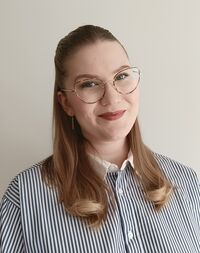 Mgr. Michaela Šaradín Lebedíková, Ph.D.
Mgr. Michaela Šaradín Lebedíková, Ph.D.
Assistant Professor
Faculty of Social Studies and FI, Department of Machine Learning and Data Processing
I am an assistant professor and postdoc researcher from the Interdisciplinary Research Team on Internet and Society (
IRTIS ). I am primarily interested in the impact of technology on well-being, specifically online sexuality and digital well-being. At the School of Informatics, I am currently working mainly on the
DigiWELL: Excellence in Research on Digital Technologies and Wellbeing project, where we are looking at the
everyday impacts of technology on adult wellbeing. In practice, this means that our participants install apps on their smartphones, through which we link so-called trace data on smartphone use with frequent questioning (up to several times a day). Using this unique data, we are able to map how technology use affects, for example, mood, stress, but also sleep. In addition, I am collaborating with colleagues in the Department of Machine Learning and Data Processing, with whom we are working on research on the application of machine learning to data from teenagers' conversations about various online and offline risks: understanding such data could help teens and their parents to more easily identify and respond to various risks.
 Mgr. Zuzana Schwarzová
Mgr. Zuzana Schwarzová
Research Associate, 4th year PhD student
Department of Computer Systems and Communications
The Faculty of Computer Science (and MUNI in general) provides the space and support to discover what one is good at and what one enjoys. During this search, I found my place in the Service Systems Laboratory (SeSLab), where I completed my Master's internship, wrote my thesis and am currently continuing my PhD studies there. It is a pleasure to watch our lab grow thanks to our joint efforts. To see that students are interested in research topics - and we reach some of them so much that they decide to pursue PhD studies at FI themselves. The SeSLab is pursuing several research directions, including the area of Smart Cities. I consider my participation in the CESMOD project, in which our faculty has successfully participated, to be a great current challenge. This project is aimed specifically at supporting the development of the Smart Cities concept in the Czech Republic and involves several Czech universities, municipalities and organisations focused on smart solutions. I appreciate very much the opportunity to be part of such an important project, and it is thanks to such opportunities that FI provides that I enjoy and find my studies at FI meaningful. (2.4.2025)
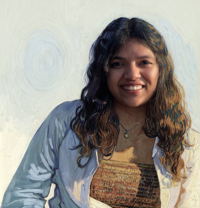 Vinaya Rajan Tawde
Vinaya Rajan Tawde
Research Associate, 2nd year PhD student
Department of Visual Informatics
As a PhD student at FI, I have found a home for my passions-a space where design, psychology, and technology intertwine in human-computer interaction. FI has given me the freedom to explore and contribute in this interdisciplinary space. I have had the privilege of working alongside brilliant researchers, dedicated professionals, and visionary scientists-each encounter broadening my understanding of game user research, each collaboration deepening my appreciation for the power of innovation. I have stood on international stages through my work, shared my research at conferences, and brought ideas to life in exhibitions. I have delved into the world of mobile augmented reality, exploring how interactive markers can foster collaboration and social connection among children. And through it all, I have been embraced by a diverse, inspiring community that fuels my curiosity and strengthens my resolve. (27.3.2025) As an international student, I have felt supported in many aspects of my PhD journey. For this, I am deeply grateful. As I look ahead, I hope to inspire more passionate minds to embark on their own journeys-growing, learning, and shaping the future with FI. (27.3.2025)
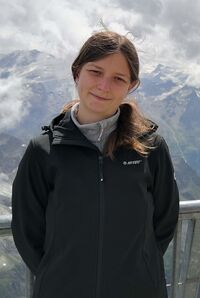 Mgr. Anna Řechtáčková
Mgr. Anna Řechtáčková
Winner of Brno Ph.D. talent 2023, student of the 2nd year of the doctoral programme
Department of Programming Theory
My master's thesis inspired me to pursue science (at least as part of my PhD). I was lucky - I found a topic connecting the areas of computer science and FI activities that I like the most: programming and its teaching, and the development of an automated tool that will save people time. So when I was deciding what to do after my Master's degree, the choice was clear. Financially it would be more appealing to develop software solutions for exclusive German clients, but this way I get to see how my work helps. I'm now researching how to effectively teach students to write more readable code, and I'm developing a tool called EduLint that automatically gives them feedback. What I especially appreciate about FI is the helpfulness of teachers to incorporate my tool into their teaching and their willingness to discuss their perspective on teaching programming. Thanks to this, my project already gives additional feedback to more than 500 students every year, and through faculty contacts we have recently managed to integrate the project into the Umíme informatiku platform, which is used by primary and secondary school students across the Czech Republic.
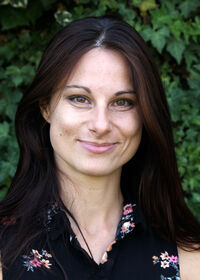 Mgr. Kamila Urban, PhD.
Mgr. Kamila Urban, PhD.
Lecturer at the FI MU Informatics Colloquium
Researcher, Department of Psychology, Faculty of Arts, Charles University / Institute of Psychology of the Slovak Academy of Sciences, v. v. i.
I came to the Faculty of Informatics thanks to an invitation to lecture at the Informatics Colloquium on metacognition and effective learning and teaching. Since I have been doing research on metacognition for several years, i.e. whether students are aware of their learning strengths and weaknesses, whether they plan their problem-solving procedure, whether they accurately monitor their understanding and whether they are able to evaluate their learning performance, I was approached to give a talk on this topic at the Department of Computer Science, but from the perspective of how teachers could develop metacognition in their students. Students in the computer science department have to solve a number of problem problems that require, in addition to domain-specific knowledge, well-developed metacognition in order to solve the problems correctly. I am always happy to offer teachers ideas on how to develop metacognition in their students, because students will then gain not only knowledge but also skills that will help them in their future learning outside of school.(23.5.2023)
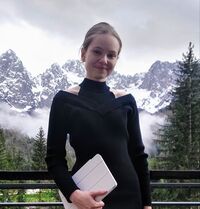 RNDr. Kristýna Pekárková
RNDr. Kristýna Pekárková
4th year PhD student, researcher
Department of Programming Theory
Thanks to the DIMEA lab, I got involved in research at FI during my undergraduate studies - first by participating in seminars and lectures and later by collaborating on papers with lab members and co-authors from abroad. This led to my decision to continue my research in theoretical computer science not only at the master's level, but also later at the doctoral level. Being able to get involved in research relatively early on made it easier for me to get a feel for how it works. It also gave me the opportunity to gain many contacts at universities and research institutions abroad. This helped me a lot at the beginning of my PhD studies, and I think that the support of the faculty and the individual labs in getting students involved in research activities and in participating in international research visits, lectures and conferences is very important. I am very happy to be studying at a faculty that creates and supports the environment for this collaboration. (7.5.2023)
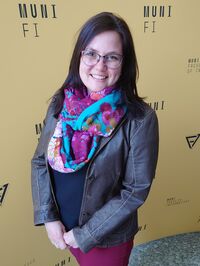 Mgr. Dana Kozlová
Mgr. Dana Kozlová
ICT Specialist
Computer Technology Centre
I joined the Faculty of Informatics, more precisely the Information System team at MU, in 2008, when I was still a library student. I started as a user support and I always enjoyed my work, as it combines everything I like - communication with people, problem solving, giving practical advice and information technology. Later I became the coordinator of the IS-technician team and started to participate more in the development of the IS. I like that every day brings new challenges and the opportunity to learn something new. Developments in IT have taken a frantic pace, but this has created new opportunities to make our users' daily work and responsibilities easier and our vision of an "e-university" is becoming clearer. I really appreciate my colleagues and the fact that I can meet intelligent and inspiring people at work. For many of us, working for the IS is a "matter of the heart" and we are doing our best to ensure that it continues to develop and continues to be (dare I say immodestly) the best learning system in the country.
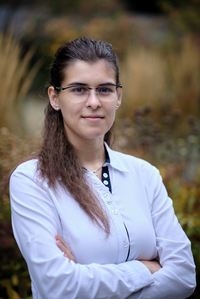 Mgr. Lucia Hradecká
Mgr. Lucia Hradecká
Brno Ph.D. talent 2022 winner, 2nd year PhD student and researcher
Department of Visual Informatics
I have been involved in research activities at FI since the beginning of my Master's studies. This gave me an idea of what kind of research is done at FI and the desire to continue it after my Master's degree. My PhD studies at FI give me opportunities that I would hardly find in the private sector: flexibility and freedom in my research, support for research stays abroad and the possibility to collaborate on interdisciplinary projects with other groups. At FI I also have the opportunity to work in a team of curious people who like to push their horizons and in a supportive atmosphere. In addition, the faculty encourages the dissemination of research awareness among individual researchers or groups through lectures and discussions, which allows me to broaden my horizons beyond my research area. Overall, this allows me to arrange my work schedule in a way that suits me best: finding the right balance of research and learning, exploring in depth and expanding my general overview, and to some extent, who and what I will collaborate with. (13.3.2023)
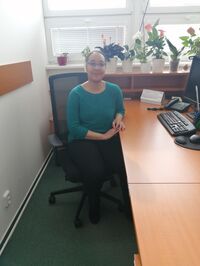 Hind Bangui PhD
Hind Bangui PhD
Research Associate
Department of Computer Systems and Communications
At FI, I work as a Researcher. My primary research interests include Artificial Intelligence, Human-Computer Interaction, and Smart Environments. FI gives me a valuable opportunity to join a good and flexible international research community. Also, FI supports me in overcoming challenges and advancing progress in my research by helping me participate in international scientific events and meet scientists around the world whose work fits into my research. These valuable opportunities make FI an inspiration to me and to any woman scientist who wants to step out of her comfort zone. (7.3.2023)
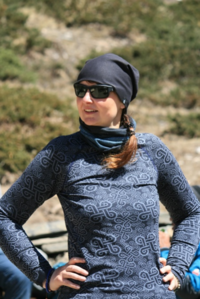 doc. RNDr. Barbora Kozlíková, Ph.D.
doc. RNDr. Barbora Kozlíková, Ph.D.
Associate Dean for Research and Doctoral Studies, Associate Professor
Department of Visual Informatics
I "grew up" at FI: I started my undergraduate studies here in 2001, and although I left for industry for a while after my PhD, I was happy to return and start my academic career here. I really appreciate the friendly working environment and the inspiration that comes from colleagues and students, which drives me forward. My position now means a lot of responsibility, but also a lot of fun and freedom in my research interests. Every day is different and full of new challenges. I am very grateful for the opportunity to start my own research group in visualization and for all the support I and my students receive. Recent research topics in our group include the exciting project "The SMC5/6 complex in nucleome organization", supported by the Ministry of Education, and more recently a project supported by the GA Czech Republic, which aims to design new visual interactive representations of chromatin fibers to help understand the complex arrangement of DNA strands in our cells. We hope that our proposed outputs will support biochemists in their research tasks. (11.2.2023)
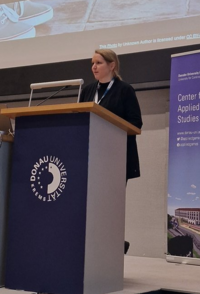 Priv.-Doz. Dipl.-Ing. Dr. Simone Kriglstein
Priv.-Doz. Dipl.-Ing. Dr. Simone Kriglstein
Associate Professor
Department of Visual Informatics
My position at FI allows me to combine my two passions as a Human-Computer Interaction researcher: Design and Games. I really appreciate at FI the opportunity and freedom to contribute to different projects in the field of Human-Computer Interaction and Games User Research. In particular, I enjoy working with students, PhD students, young researchers and colleagues on exciting research questions and topics which allows me to pursue my research in the area of Games User Research at FI. I would especially like to emphasize the helpful and collegial environment at FI, which supported me and my research from the very beginning. I'm also very passionate about mentorship to support students in their academic career journey. At FI there is, for example, the possibility to get a PhD scholarship, which is a great initiative for PhD students to get started and develop their own PhD projects. (11.2.2023)
Photo: Natalie Denk
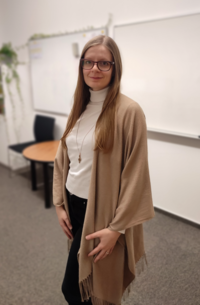 RNDr. Katarína Furmanová, Ph.D.
RNDr. Katarína Furmanová, Ph.D.
Assistant Professor
Department of Visual Informatics
I did my entire undergraduate studies at FI and after a post-doctoral position abroad, I was happy to come back here. As a student, what I valued most about FI was the opportunity to choose from a wide range of courses and to get involved in practical and research projects during my studies, which ultimately led me to stay in academia. Opportunities to travel, gain experience from abroad, and establish collaborations with other research groups also played a role. I am glad that FI supports these activities. It is also important for me because I am doing research in the field of biomedical visualisation, which requires collaboration with experts from other fields. This brings with it some challenges but at the same time I am constantly learning something new and educating myself in other areas. This is what I really enjoy about my work and I am grateful to be able to work in an environment that allows me to develop myself further and share my experience with students in this way. (11.2.2023)
More personality medallions
Support for work-life balance and employee benefits
We support the harmonisation of work, personal and family life of FI employees. At FI, flexible working hours and occasional telecommuting (home office) are in place, part-time work and individual schedules are encouraged, and employees can place their children in Elanek or Loučka playgroups. Obligations, advice and useful links on maternity, paternity and parental leave are available in interactive form on the
MU Employee Portal or in the
Maternity, Paternity and Parental Leave Handbook (available only after logging in).
We also strive to improve the wellbeing of female and male FI employees. Every year MU organises many university-wide events and gatherings for staff, students and alumni (e.g.
MUNI Day,
MUNI HR Day, MUNI Run,
Health Day - Movement, Nutrition and Regeneration for a Better Life, Scientists' Night, Let's Clean MU), and a number of faculty activities take place. FI employees can take advantage of a wide range of
employee benefits , the offer of which is constantly expanding (e.g. free psychological counselling for employees, employee, accompanying and children's Multisport cards, vaccination against tick-borne encephalitis and flu, nursery fees, DIP).
However, there is still room for improvement, you can send your suggestions to
pers8viS3yLOs@fii9J-nYg0Q.muni_nlAYjz-T.cz.
Articles
Inspiring women from around the world at FI lectures/events
Many inspiring women working in IT outside FI, whether at other MU faculties, other Czech or foreign universities or in commercial companies, share their knowledge, experiences and stories with us at IT colloquia, lectures, workshops, etc. The following events will take place or have already taken place at FI in 2025:
13 May 2025 -
Radka Svobodová, Ph.D. from CEITEC MUNI - lecture within the Informatics Colloquium on "What challenges do biomolecules bring to IT?"
23. 4. 2025 -
Ing. Dr.rer.nat. Angelika Lahnsteiner, MSc. B.rer.nat. University of Salzburg (Austria) - lecture on "G-quadruplexes are sites of differential methylation and alternative promoter usage in metabolic disorders and cancer".
Interview with Elham Kargar Tazargh, graduate in Visual Informatics at the Faculty of Computer Science
Elham Kargar Tazargh, originally from Iran, graduated from the Faculty of Computer Science with a degree in Visual Informatics, specializing in computer game development. Today she works as a UX designer in a software company. In her free time, she organizes meetings for UX experts, enthusiasts and beginners, actively developing and connecting the UX design community in Brno.
You can read the full interview with Elham about her studies at FI, job search, working at SAP, leading the UX community in Brno, etc. in
M Magazine.
Returns that make sense: Monika Čechová back at the Faculty of Informatics
The second edition of the Czexpats in Science Award ceremony took place at MU. One of the trio of awardees is Monika Čechová, Assistant Professor at the FI Department of Machine Learning and Data Processing, who gave a talk at the Czexpats in Science Awards ceremony entitled "Genomics of the future: complex DNA parts and their inheritance across generations", in which she presented a revolution in DNA reading related to new technological possibilities such as nanopore sequencing.
The award is given by the Czexpats in Science initiative to emerging Czech scientists working abroad while maintaining contact with the domestic scientific community. It highlights the contribution of expertise and experience gained abroad to the development of domestic science.
Read the full article in
M Magazine.

Monika Čechová, winner of the Czexpats in Science Prize, who is now working at FI
Read an inspiring interview with Monika Čechová, who has been working at FI since February 2025 as an Assistant Professor in the Department of Machine Learning and Data Processing and who is also the winner of this year's Czexpats in Science Award. This award aims to support and publicly recognise the work and achievements of Czech scientists abroad.
Monika Čechová works as an assistant professor at FI on connecting biology with modern computational methods and expanding collaboration between scientists. In addition to research, she is also promoting the new study programme Bioinformatics. She also wants to get more involved in public communication and give talks at events such as Masaryk University's TEDx or the University of the Third Age. Prior to joining FI this year, she was a postdoc at the University of Pennsylvania and the University of California.
Read the full interview with Monika Čechová in the
article "The future of genomics is now unfolding, says Czexpats in Science award winner new to FI" on the FI website.
Getting the Balance Right: Gender and the Adacemic Workplace
A workshop with lecturer
Lynn P. Nygaard will be held on
March 19, 2025, from 9:00 to 10:40 a.m. in the MU building,
2 Komensky Square, room S117. The workshop is organised by the Faculty of Social Studies as part of the Centrepeace, Horizon Twinning project.
Abstract: Statistics on working life in academia often show striking differences between men and women in terms of publication output, promotion and well-being. In this workshop, Lynn P. Nygaard will explain how these apparent disparities arise and discuss what research environments can do to increase gender equality and job satisfaction in their organizations.
You can register for the workshop
HERE .

Invitations to events related to the International Day of Women and Girls in Science 2025
What conferences, workshops and other events are taking place this year as part of the International Day of Women and Girls in Science?
On February 11, 2025, the conference
"Become a Woman Scientist for a Day" will be organized by the Faculty of Nuclear Engineering of CTU together with the Faculty of Electrical Engineering of CTU, in collaboration with Second Foundation, BNL-CZ and CERN-CZ. The conference, with female experts from practice and academia, will offer participants the opportunity to experience science first-hand. They can choose from topics ranging from particle physics to robotics to precision machine calibration.
The Faculty of Science of Charles University is organising the
Women in Science: Challenges and Opportunities on the Way event on 11 February 2025. The event starts at 5.30pm - an evening full of inspiring stories and stimulating discussions, with women researchers from different backgrounds sharing their experiences.
Palacký University in Olomouc is organising a "Debate with female scientists in the Fortress of Knowledge" on 10 February 2025 and a "
Breakfast with Science in the Student Club" on 11 February 2025, which is especially intended for junior female scientists and PhD students. Mgr. Michaela Šaradín Lebídková, Ph.D. from the Faculty of Social Studies MU (FSS MU). Her main research interest is digital intimacy and digital wellbeing, which she explores through the lens of media effects. The topic of digital wellbeing is addressed in a joint project of FSS MU and FI MU.
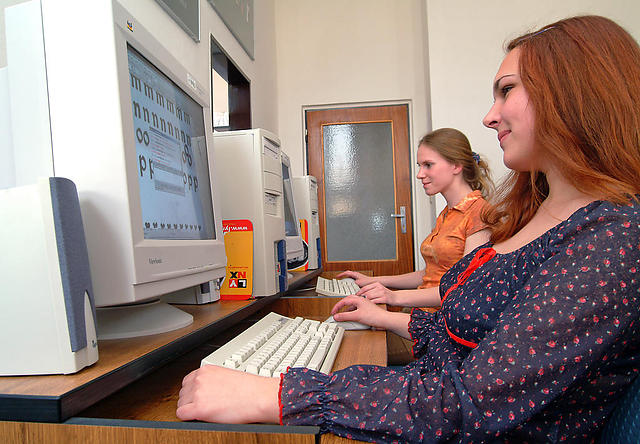
International Day of Women and Girls in Science 11 February 2025 with NKC - Gender and Science
What is happening this year as part of the International Day of Women and Girls in Science? It is on 11 February 2025 that NKC - Gender and Science will launch a month-long campaign to highlight the changes that should happen in the Czech academic environment to prevent a talent drain and suppression of the potential of women and other marginalised groups. Through the involvement of inspiring women scientists and science students, the campaign aims to highlight that change is not only desirable, but necessary.
This year's NCC campaign for International Day of Women and Girls will run for a month, leading up to Women's History Month and International Women's Day in March. Its international motto this year is Accelerate Action: that is why NKC wants to stress the need for change in the Czech academic environment. What prevents women scientists from developing successful scientific careers? What barriers do they have to face? What do they wish would change? For more information about the campaign, follow the website
www.genderaveda.cz.
MU Gender Equality Plan 2025-2028
MU is implementing a variety of measures to promote gender equality as part of the University's strategic commitment to the principles of transparency, equality and accountability, while balancing the work and personal lives of all its staff and students. It fulfils this commitment at the level of its units and through the activities of the University as a whole. All this is done on the basis of the MU Gender Equality Plans as well as the sub-gender plans of individual MU faculties and institutes.
The measures set out in the
MU Gender Equality Plan 2025-2028 are currently being implemented.
To promote gender equality at MU, the university website
Gender Equality at MU was launched in January 2025.
On the page you can find out more about the gender plans, important people and institutions, and the GEP working group at MU. You will also find various educational events, publications and statistics.
Other articles
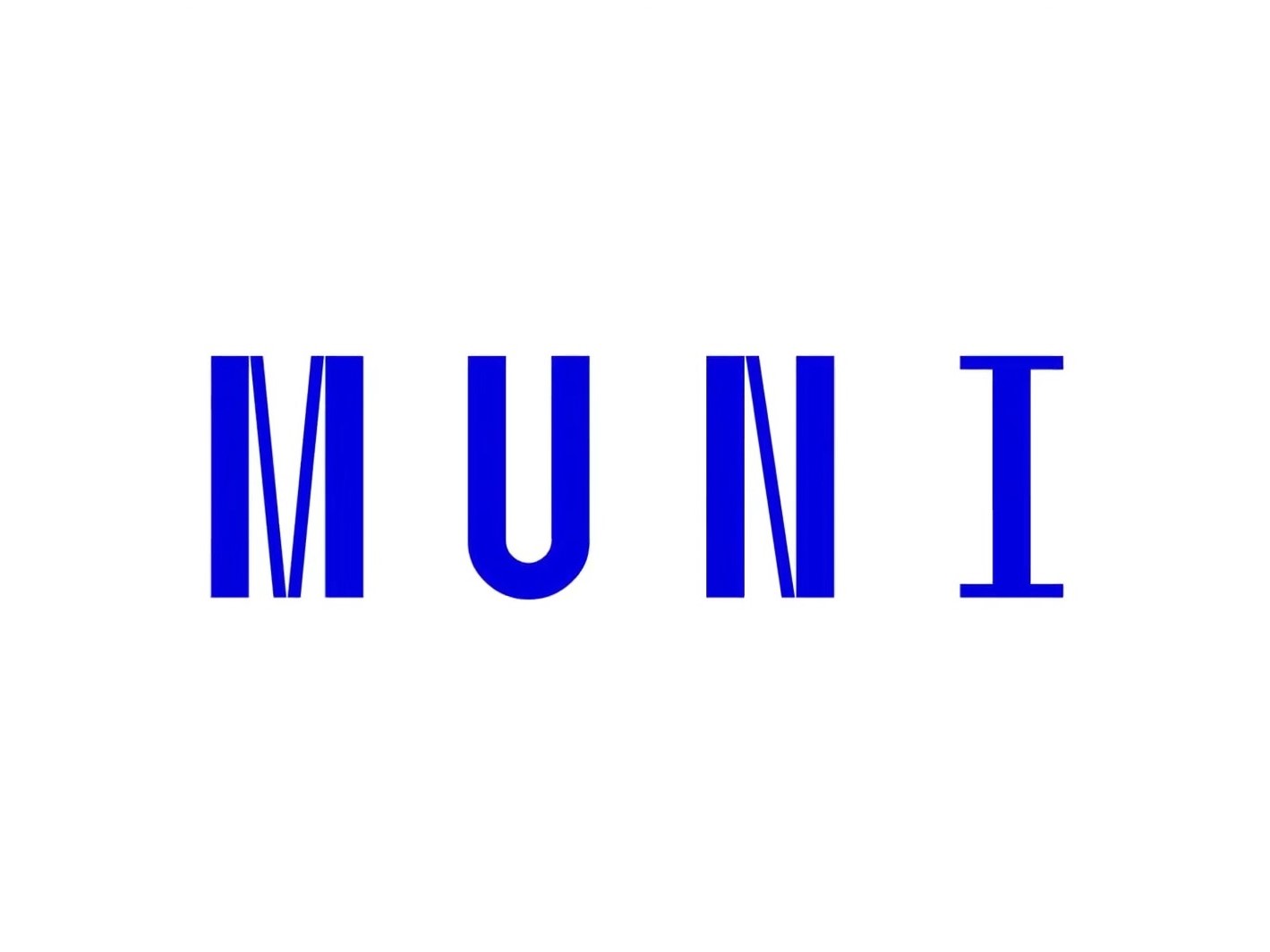
 Mgr. Michaela Šaradín Lebedíková, Ph.D.
Mgr. Michaela Šaradín Lebedíková, Ph.D.
 Mgr. Zuzana Schwarzová
Mgr. Zuzana Schwarzová
 Vinaya Rajan Tawde
Vinaya Rajan Tawde
 Mgr. Anna Řechtáčková
Mgr. Anna Řechtáčková
 Mgr. Kamila Urban, PhD.
Mgr. Kamila Urban, PhD.
 RNDr. Kristýna Pekárková
RNDr. Kristýna Pekárková
 Mgr. Dana Kozlová
Mgr. Dana Kozlová
 Mgr. Lucia Hradecká
Mgr. Lucia Hradecká
 Hind Bangui PhD
Hind Bangui PhD
 doc. RNDr. Barbora Kozlíková, Ph.D.
doc. RNDr. Barbora Kozlíková, Ph.D.
 Priv.-Doz. Dipl.-Ing. Dr. Simone Kriglstein
Priv.-Doz. Dipl.-Ing. Dr. Simone Kriglstein
 RNDr. Katarína Furmanová, Ph.D.
RNDr. Katarína Furmanová, Ph.D.






